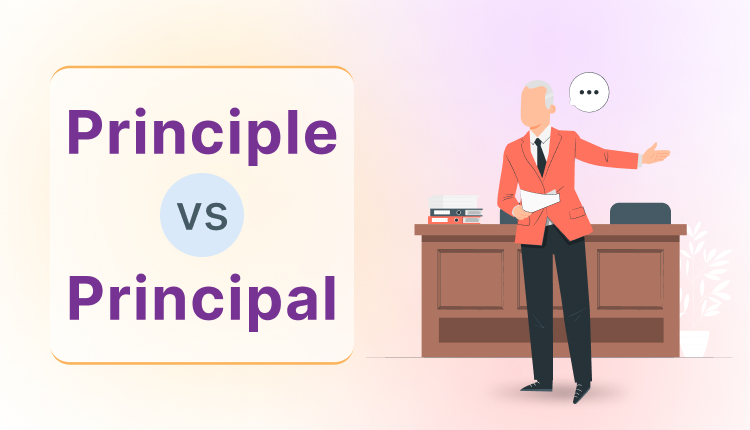The words “principal” and “principle” sound identical but have completely different meanings and spellings. Such words are known as homophones. Their existence in the language of English leads to a lot of confusion. Both these words carry distinct meanings.
Hence, it is important to understand their definitions and usages to use them appropriately in right context.
Definition of the Principal
The word “Principal” can be used as both a noun and an adjective.
As a noun, it refers to a person who is in an authoritative position. It is most commonly used as an alternative term for the head master of a school. It is also used to denote the primary culprit behind a criminal act or the original amount of a loan before the interest is added to it.
Examples:
- After being the chemistry teacher at the institute for 10 years, Sammy was made the new principle.
- Harry was let go of by the police due to lack of evidence portraying him as the principal culprit in the bank robbery.
As an adjective, principal is used to signify something that is of most importance or has a primary role.
Examples:
- Motivating young minds to think beyond the limits was the principal objective behind organizing the science fair.
- Harry paid off the principal amount of $5,000.
Definition of the Principle
Principle is used as a noun and it refers to a fundamental truth, law, rule, or code of conduct, whether scientific, legal, moral, or otherwise. It is all about these guiding standards.
Examples:
- The democratic principle of freedom of speech is widely upheld.
- As a matter of principle, the lawyer refused cases from corporations that he perceived as unethical.
Principle is also used as a phrase in the form of “in principle”. It means the idea or a plan in its theoretical stage before the details are finalized.
Example:
- The committee agreed in principle with the policy proposal but demanded a a more detailed action plan.
Principal vs. Principle: Financial terms
In financial context, grasping the difference between principal and principle is crucial. Principal refers to the original amount that was borrowed, invested, or owed, excluding interest or fees. Whereas, a principle is a fundamental rule or ethical code that will act as a guiding standard for financial practices.
Principal vs. Principle: Educational terms
In educational institutes, the principal is the highest-ranking administrator responsible for the entire school’s operations and staff. Whereas, a principle is a basic truth or philosophical rule underlying teaching philosophies or decision-making.
Tips to Remember the Difference
Although “principal” and “principle” sound the same, different tricks can be used to remember their difference:
- “Principal” contains the word “pal” at the end. It can be used to indicate principal as an authoritative person.
- “Principle” ends with the same letters that exist in the word “rule,” both referring to fundamental truths or standards.
- “Principal” ends with “a” like “adjective.” Hence, we can remember that among the homophones only “principal” can be used as a descriptive word.
Understanding the rules that govern the use of “principal” and “principle” is crucial for clear and effective communication in English. Grasping their functions and practicing with examples can give you the confidence to use them correctly.
Check how well you have used these terms in the right context in your academic writing and get instant feedback with grammar checker tools like Trinka AI. Such tools go beyond the role of checking grammar and ensure that words are used in the right contextual sense.
With such AI language assistance, ensure that your academic writing is free from the traps of “principal” and “principle”.

